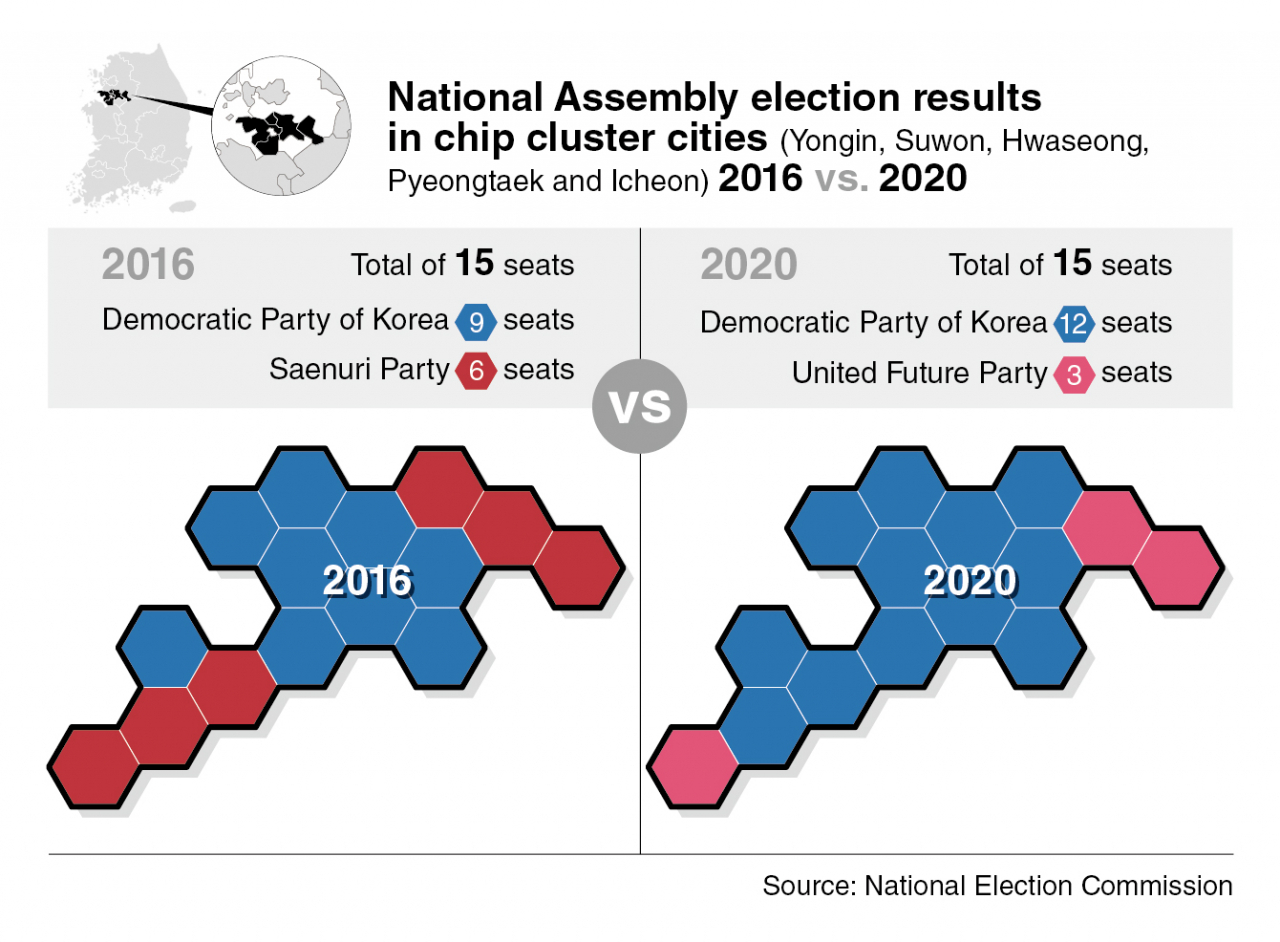 |
Graphic by Park Ji-young |
HWASEONG, Gyeonggi Province -- Hwaseong City lies at the heart of South Korea's chip industry cluster in the southern part of Gyeonggi Province, which anticipates a total of 622 trillion won ($462.1 billion) in spending by 2047 and 3 million new jobs.
With a large capital commitment constantly drawing young voters to the chip cluster in the south of Seoul, the number of constituencies in five such cities -- Hwaseong, Suwon, Yongin, Pyeongtaek and Icheon -- increased to 17 for the April election from 15 in the 2020 election.
Hwaseong is an example, as the city's population surpassed the 1 million mark for the first time in its history in September, and its population's age averaged below 40, a rare case for an administrative unit of the country experiencing population aging.
The demographic change in Hwaseong triggered a transition of what was once a conservative stronghold into a liberal bastion, and this year's election is unlikely an exception.
But the liberal bloc's candidate is set to engage in an uphill battle, as he faces a former chip technician of Samsung Electronics who represents the ruling party, and a high-profile political figure who formerly led the ruling party.
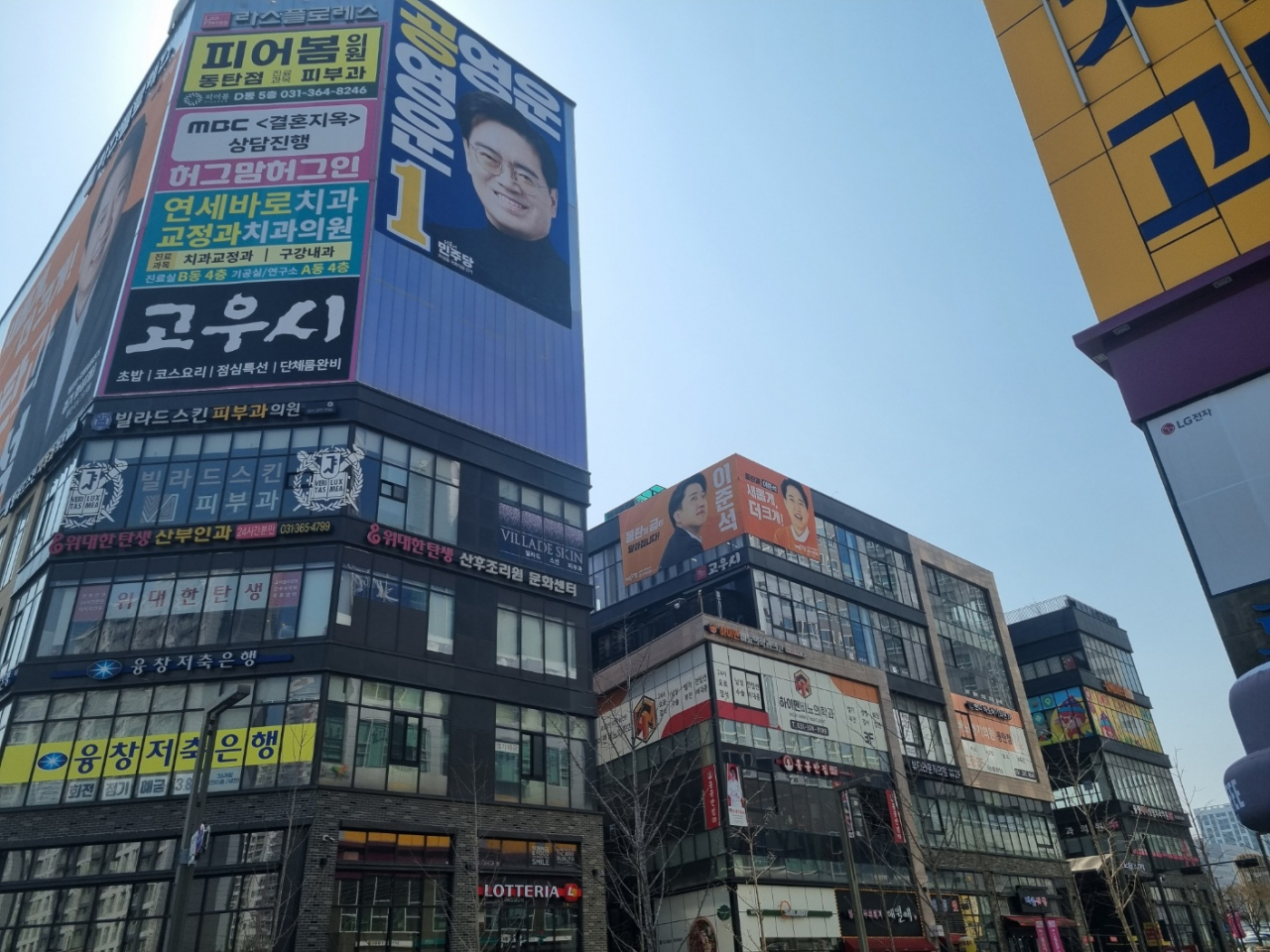 |
In this photo, parliamentary election candidates in the Hwaseong-B constituency have posted election campaign posters on commercial buildings in Dongtan, a commuter city in Hwaseong, Gyeonggi Province, (Son Ji-hyoung/The Korea Herald) |
Hwaseong's young voter influx is particularly notable in Dongtan, a commuter town neighboring a chipmaking complex surrounding Samsung Electronics Hwaseong Campus.
A constituency named Hwaseong-B used to serve the whole township of Dongtan. But the relentless growth of its population prompted a redrawing of the electoral district, largely separating the district into two -- Hwaseong-B and Hwaseong-D -- for the April general election.
Rep. Lee Won-wook, a liberal lawmaker formerly of the Democratic Party of Korea, now serves his third term there.
Lee has enjoyed a strong liberal support base in his constituency over the past decade, as Dongtan New Town came into being in 2007 on what used to be farmland. In the last general election in 2020, Lee beat his conservative rival by a 30 percentage-point margin.
For the April election, young political veteran Lee Jun-seok will take the incumbent Lee's place to jockey for the parliamentary seat for the Hwaseong-B constituency. The incumbent, who defected to the New Reform Party, will vie for a seat at the newly-created Hwaseong-D constituency.
Lee, 38, was a front man of the conservative People Power Party when Yoon Suk Yeol won the presidential election in 2022. But when he was embroiled in a sexual bribery scandal later in the same year, he estranged himself from the party and went on to found the New Reform Party in January of this year.
Lee will contend with the 40-year-old Han Jung-min of the People Power Party, a chip expert who formerly worked at Samsung Electronics, and former Hyundai Motor president Kong Young-woon, 59, who now belongs to the Democratic Party.
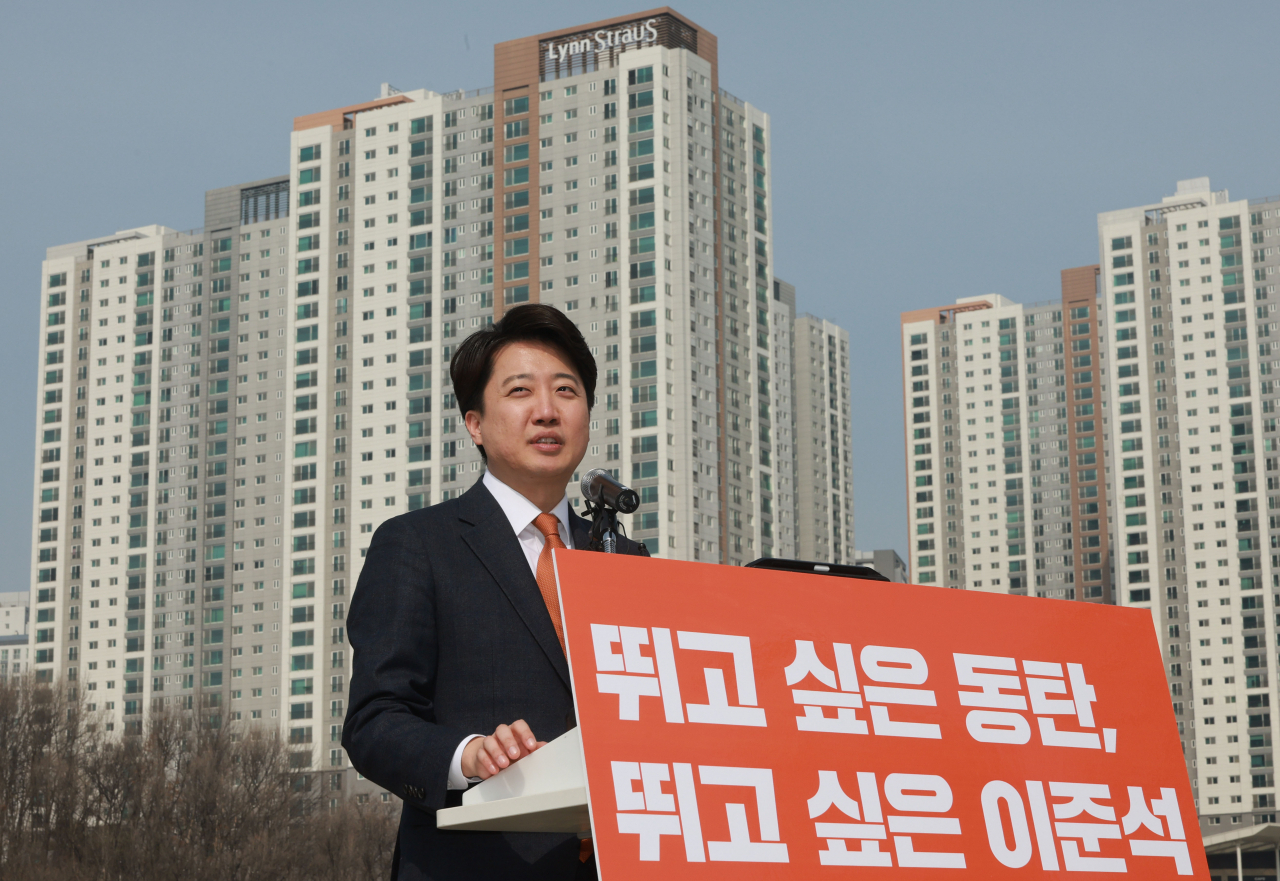 |
Lee Jun-seok, chair of the New Reform Party, expresses his bid to vie for a parliamentary seat representing the Hwaseong-B constituency in February. (Yonhap) |
Candidates have placed their primary focus on the chip industry to lay out election pledges and garner voter attraction, so far.
Han, who identified himself as a Dongtan resident, was at odds with Kong over whether renewable energy adoption in chip production should be prioritized in South Korea's bid to gain an upper edge in the world's semiconductor chip arms race.
Han told The Korea Herald that the use of renewables in the chip industry "is unrealistic because of the renewable energy's nature of instability in the supply side." He added that the industry may adopt nuclear energy to help the country achieve carbon neutrality goals and ensure a stable electricity supply.
Kong, on the other hand, has pushed forward with his pledge in mid-March to restore South Korea's plan to join the RE100 initiative and allow the domestic chip industry to take priority in gaining access to renewable energy distribution.
"(Joining) RE100 initiative is a matter of survival (for the domestic manufacturing industry)," Kong told The Korea Herald in a written interview.
He claimed the government must step up to raise the target for the domestic industry related to renewable energy use, and lay out support for it, as regulatory obstacles loom for products that were not manufactured with renewable electricity worldwide.
"A RE100 certification will serve as a passport you would need to (let your manufactured goods) enter a foreign market," he noted.
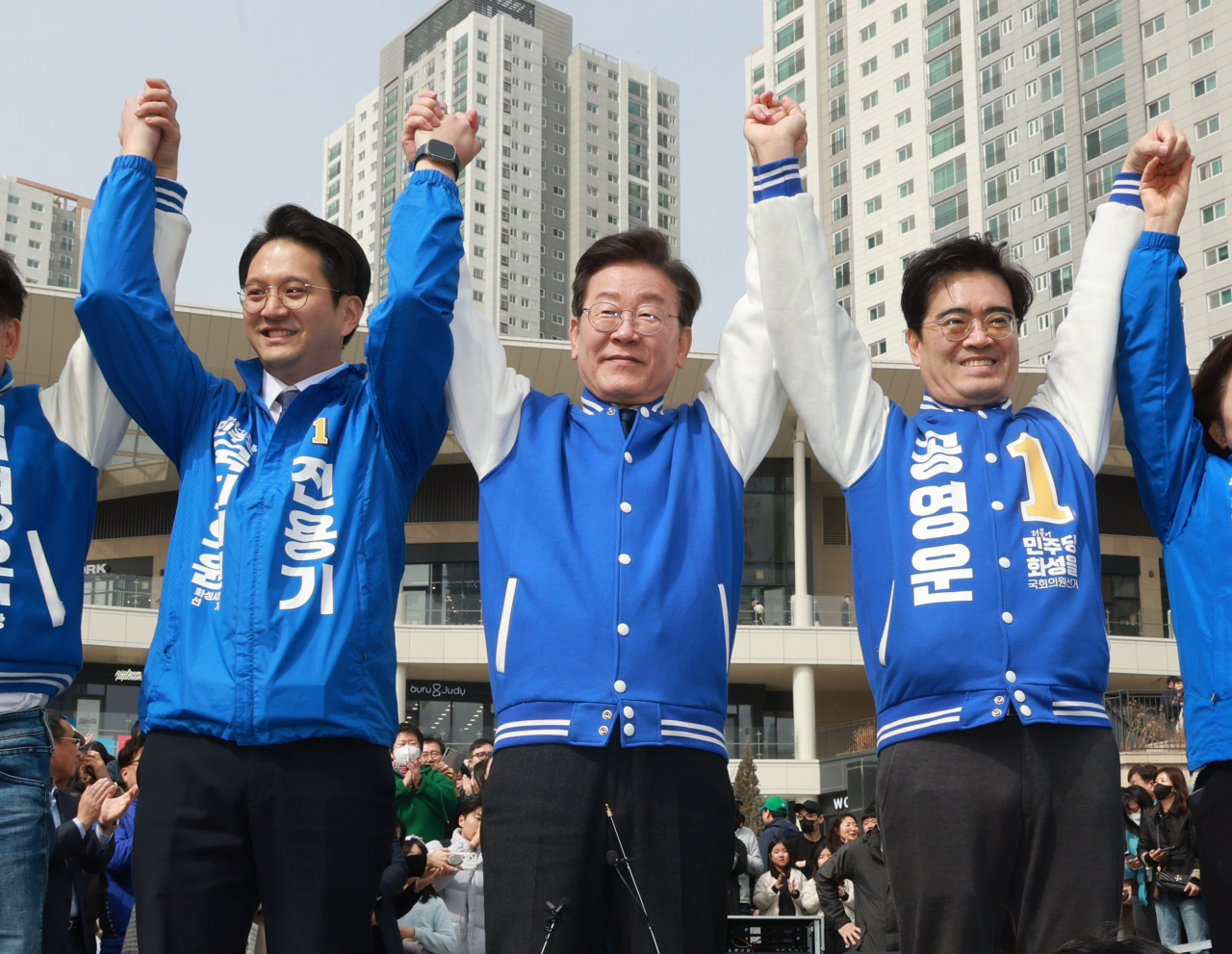 |
Kong Young-woon (right), the candidate for the Hwaseong-B electoral district representing the main opposition Democratic Party of Korea, poses with Democratic Party Chair Rep. Lee Jae-myung during their visit to Dongtan, a commuter city in Hwaseong, Gyeonggi Province, on March 17. (Yonhap) |
Both Han and Kong are on the same page in terms of extending the lifespan of the Korean equivalent to the Chips Act -- aimed at doubling the tax deduction rate to large chipmakers and raising the rate by 50 percent for small- and mid-sized chipmakers.
The bill, passed early in 2023, is to expire at the end of this year. The ruling bloc sought to pass the law to defer the bill's sunset clause by six years, but the chances of the passage are very narrow because the parliament is now focused on the upcoming elections.
Han said extending the bill is his foremost task, playing down the view from the progressives that the tax deduction is benefitting chaebol families as "not meeting the global standard."
Kong also agreed on this, "given that a chip-related investment leads to a mass-production of chips in at least three or four years after the investment decision."
Lee of the New Reform Party also visited the Samsung location with other candidates of his party -- Lee Won-wook of Hwaseong-D and Yang Hyang-ja, former Samsung chip technician-turned-politician who vie for a seat at Yongin-A -- and unveiled his plans to attract new chip research center.
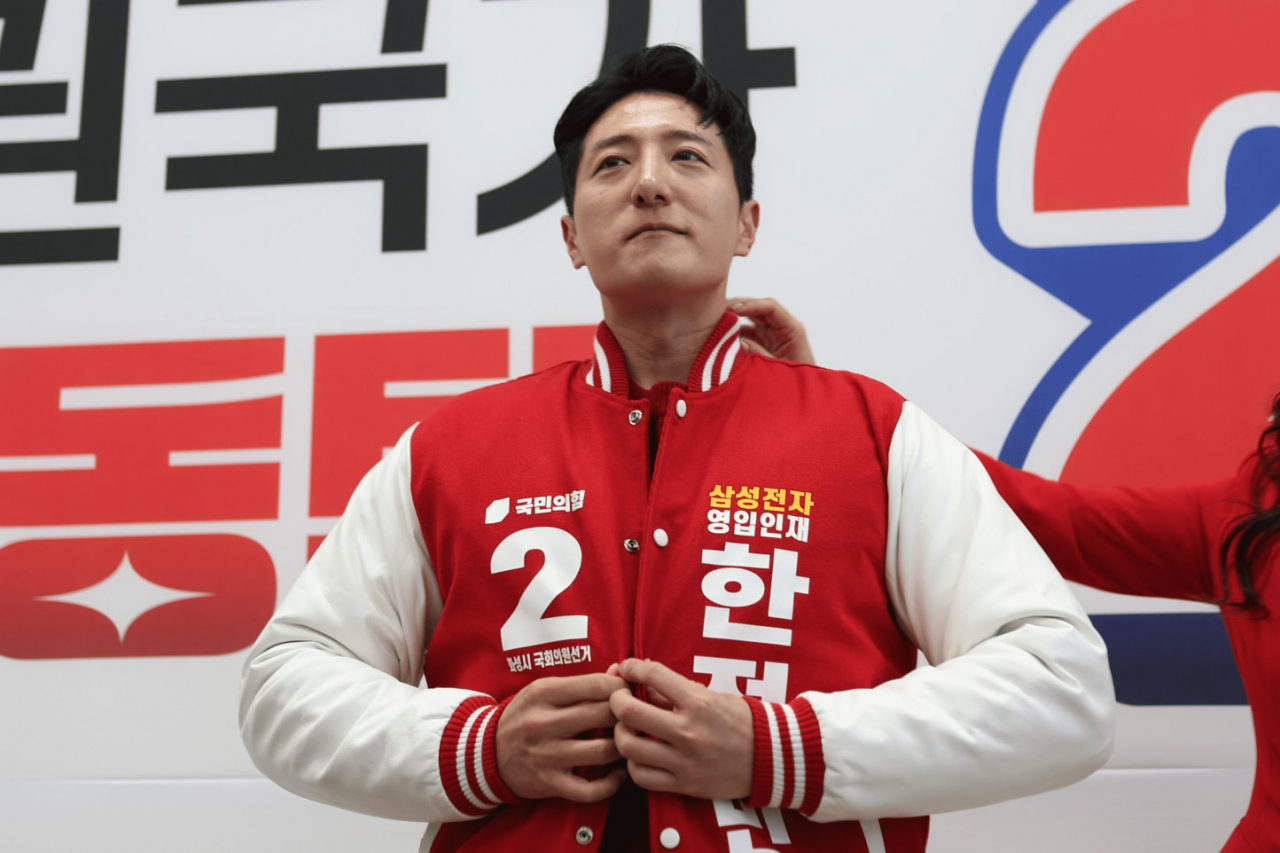 |
Han Jung-min, the People Power Party candidate for the Hwaseong-B constituency (courtesy of Han Jung-min's office) |
But young voters often found themselves unable to relate to such chip cluster pledges.
A 28-year-old Dongtan resident who wished to be identified by only her surname Kim, said the candidates' race over semiconductor-related polities did not strike a chord for her.
"My workplace does not have to do with (semiconductor industry), so that's why I believe (semiconductor-related pledges) do not resonate with me," Kim said.
To Kim, who said she already chose who to vote for, inflation bites hard.
"Prices are high everywhere," she said. "I am employed, so I can feel that especially when I go out for lunch. We need more policies that benefit ordinary people."
Another Dongtan citizen, a 25-year-old surnamed Kim, identified himself as a fence-sitter, and sugar-coated election pledges are unlikely to persuade him.
"I don't believe all the election pledges they make would be realized. I'll vote for the right candidate based on a couple of realistic ones," Kim said.
When asked about his anticipation for the pledges over chip-related investments, he said these issues are not relatable "because none of (his) family are involved in the industry."
"The economy is hit hard, so I hope (candidates) could focus on that aspect when laying out new pledges," he said.
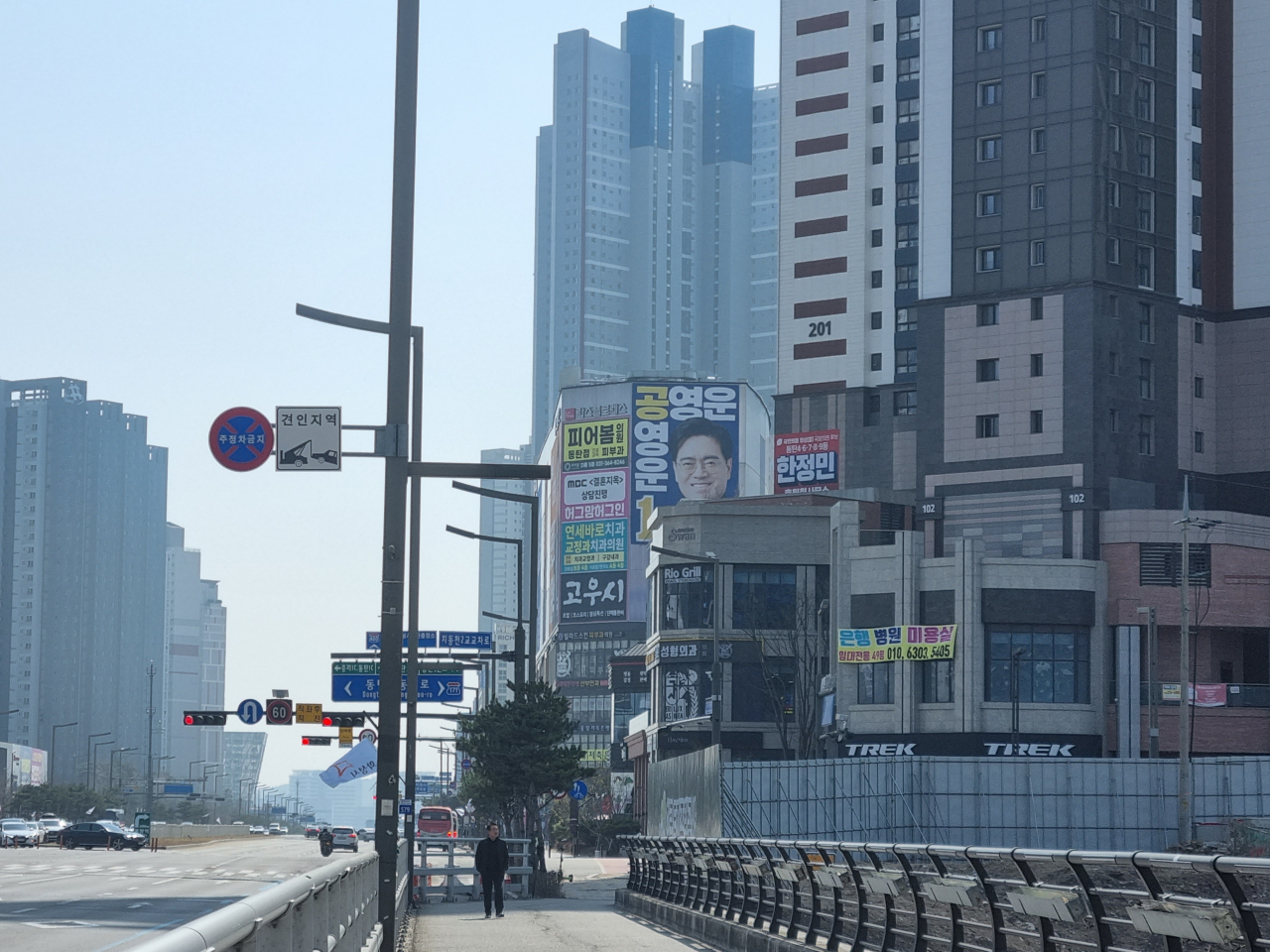 |
In this photo, parliamentary election candidates in the Hwaseong-B constituency have posted election campaign posters on commercial buildings in Dongtan, a commuter city in Hwaseong, Gyeonggi Province, (Son Ji-hyoung/The Korea Herald) |
There was also a call for the new lawmaker to enhance the public infrastructure in line with the population influx.
A 31-year-old woman surnamed Cho, who did not express her intention to vote, said Dongtan residents are experiencing a lack of transportation service.
"Last week, I remember it took me two hours to drive to Pangyo (in southern Gyeonggi Province) to commute to work because of a car accident on a highway," she said. "But if you do not own a car, it is very hard to move around (in Dongtan). Taxis are hard to find, and buses do not come frequently."
Dongtan township's population reached about 400,000 in late 2023, up by 25 percent in about five years, Dongtan population's age averaged 35.5 as of February, compared with the average of 44.9 nationwide.
Along with Hwaseong-B and Hwaseong-D constituencies, also under the spotlight are Yongin A constituency, home to a district of Yongin, Gyeonggi Province, where chip giants Samsung and SK hynix vowed to spend a combined 480 trillion won to advance chip production; Pyeongtaek-B constituency of Pyeongtaek, Gyeonggi Province, which covers Godeok New Town near Samsung's Pyeongtaek Campus; and Suwon-D constituency, where Samsung's headquarters and a research center are located.




![[Exclusive] Hyundai Mobis eyes closer ties with BYD](http://res.heraldm.com/phpwas/restmb_idxmake.php?idx=644&simg=/content/image/2024/11/25/20241125050044_0.jpg)
![[Herald Review] 'Gangnam B-Side' combines social realism with masterful suspense, performance](http://res.heraldm.com/phpwas/restmb_idxmake.php?idx=644&simg=/content/image/2024/11/25/20241125050072_0.jpg)

